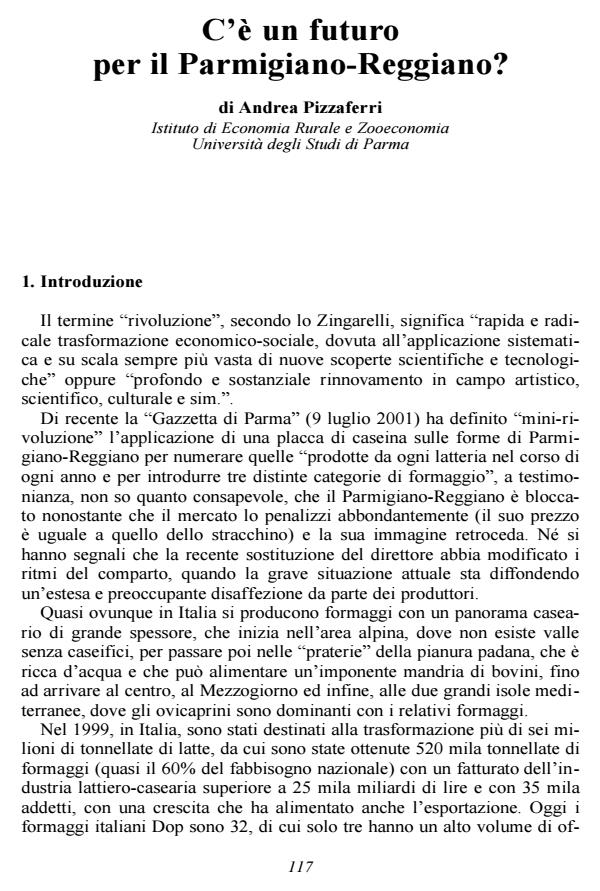C'è un futuro per il Parmigiano-Reggiano?
Titolo Rivista ECONOMIA AGRO-ALIMENTARE
Autori/Curatori Andrea Pizzaferri
Anno di pubblicazione 2004 Fascicolo 2001/2
Lingua Italiano Numero pagine 19 P. Dimensione file 73 KB
DOI
Il DOI è il codice a barre della proprietà intellettuale: per saperne di più
clicca qui
Qui sotto puoi vedere in anteprima la prima pagina di questo articolo.
Se questo articolo ti interessa, lo puoi acquistare (e scaricare in formato pdf) seguendo le facili indicazioni per acquistare il download credit. Acquista Download Credits per scaricare questo Articolo in formato PDF

FrancoAngeli è membro della Publishers International Linking Association, Inc (PILA), associazione indipendente e non profit per facilitare (attraverso i servizi tecnologici implementati da CrossRef.org) l’accesso degli studiosi ai contenuti digitali nelle pubblicazioni professionali e scientifiche.
Parmigiano-Reggiano (cheese produced exclusively in the provinces of Parma and Reggio Emilia) is considered by many to be one of the best cheeses in the world, but today it faces a dilemma: confronted by a potential demand from millions of people world-wide who know it and would willingly consume it, there is only a handful of people, outside the national boundaries that can buy it, because nobody, or at least very few have made it possible for this product to cross over the Alps. This has created a glut in the domestic market, and has had a negative impact on its price, which is too low given the quality, high production costs and the image this cheese enjoys. The dispersion of the many small businesses producing parmesan cheese, together with the almost total absence, at product sector level, of even the minimum attempt at setting up some sort of trade or commercial organisation has favoured the acquisition by others, who are better organised and part of the distribution chain, of the vast majority of profits deriving from this production. Not even the Consortium protecting this speciality food has been able to improve the serious situation in which the sector finds itself, promoting and activating policies that are often penalising (see self-regulation) and not targeted to the commercial reality. In order to guarantee a top market and stable price for this product, it is necessary for demand to constantly exceed supply, and that, in this specific context, means exports. It is therefore necessary to intervene both at a market and operative level. In the former case, it is the organisation of producers who need to tackle market problems both in terms of supplying traditional markets as well as new ones. Intervention at an operative level includes producers completing the aging cycle of this cheese and consolidating the supply of aged cheese with the aim of reducing marketing unit costs.
Andrea Pizzaferri, C'è un futuro per il Parmigiano-Reggiano? in "ECONOMIA AGRO-ALIMENTARE" 2/2001, pp , DOI: